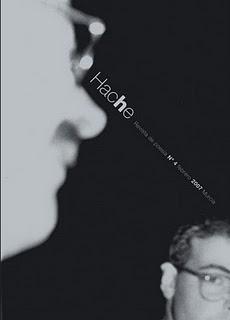
Hace mucho tiempo ya, comencé a repasar los números de la revista de poesía que editábamos C y yo; de hecho, desde la última reseña, la del número 3, pareciera que ha pasado casi una vida.
En el número 4 de la revista de poesía 'Hache' tuvimos la suerte de publicar poemas de Kepa Murua, Jorge Riechmann, Mariano Peyrou, Antonio Lucas, Raquel Lanseros, Luis Pablo Núñez, José Ángel García Caballero, Óscar Curieses, Mercedes Díaz-Villarías, José Antonio Martínez Muñoz, Julián Cañizares, José Daniel Espejo, Joaquín Juan Penalva y Juan Manuel Soriano, así como una traducción del poema 'A word from the Loki' de Maurice Riordan realizada por José Daniel Espejo.

Este número tuvimos la suerte de poder presentarlo en la librería 'La Central' de Madrid, y el lujo de que estuvieran con nosotros en dicha presentación Mercedes Díaz-Villarías y Antonio Lucas.
Bueno, como siempre hemos defendido la valía humana y poética de José Daniel, hoy dejo aquí la traducción que le publicamos.
A WORD FROM THE LOKI
The Loki tongue does not lend itself
to description along classical lines.
Consider the vowels: there are just four,
including one produced by inspiration
(i. e. indrawn breath), which then requires
an acrobatic feat of projection
to engage with its troupe of consonants.
The skilled linguist can manage, at best,
a sort of tattoo; whereas the Loki
form sounds of balletic exactness.
Consider further: that the tribe has evolved
this strenuous means of articulation
for one word, a defective verb
used in ona mood only, the optative.
No semantic equivalent can be found
in English, nor within Indo-European.
Loosely, the word might be glossed as to joke,
provided we cite several other usages,
such as to recover from snakebite;
to eat fish with the ancestors;
to die at home in the village, survived
by all of one's sons and grandsons.
It is prohibited in daily speech,
and the Loki, a moderate people
who abjure physical punishments,
are severe in enforcing this taboo,
since all offenders, of whatever age
or status, are handed over to mouri
–sent, in effect, to a gruesome death:
for the victim is put on board a raft,
given a gourd of drinking water, a knife,
and one of those raucous owl-faced
monkeys as companion, then towed
to midstream and set loose on the current.
Yet the taboo is relaxed at so-called
'joke parties': impromptu celebrations
that can be provoked by multiple births
or by an out-of-season cath of bluefish.
They are occasions for story-telling
and poetry, and serve a useful end
in allowing the young to learn this verb
and to perfect its exact delivery.
For the word is held to have come down
from the ancestral gods, to be their one gift.
And its occult use is specific: to ward off
the Loordhu, a cannibalistic horde,
believed to roam the interior forest,
who are reputed to like their meat
fresh and raw, to keep children in lieu of pigs,
and to treat eye and tongue as delicacies.
The proximity of danger is heralded
by a despondency that seems to strike
without visible cause but which effects
a swift change among a people by nature
brave and practical, bringing to a stop
in a matter of hours all work, play, talk.
At such crises, the villagers advance
to the riverbank and, as night falls,
they climb into the trees, there to recite
this verb throughout the hours of darkness.
But since, in the memory of the village,
the Loordhu have never yet attacked,
one has reason to doubt the existence
of an imminent threat to the Loki –
who nonetheless continue, in suspense, their chant.
At once wistful and eerie, it produces
this observable result: that it quells
the commotion of the guenon monkeys
and lulls, within its range, the great forest.
UNA PALABRA DE LOS LOKI
La lengua Loki no se presta
a ser descrita en términos clásicos.
Fíjese en las vocales: sólo hay cuatro,
con una, articulada por inspiración
(es decir, tomando aire), que requiere
un milagro acrobático de la garganta
para encajarla con sus consonantes.
Un experto lingüista sólo consigue, con suerte,
una especie de aproximación, pero los Loki
la emiten con una precisión de bailarina.
Fíjese además en que la tribu ha producido
esta agotadora forma de articulación
para una palabra, un verbo intransitivo
empleado en sólo un modo, el optativo.
No hay equivalencias semánticas
en inglés, ni en todo el indoeuropeo.
A grandes rasgos, podemos traducir por bromear,
siempre que citemos otros usos,
como curarse de una picadura de serpiente,
comer pescado con los antepasados,
morir en casa en el poblado, sobrevivido
por todos los hijos y nietos de uno.
Está prohibida en el habla diaria,
y los Loki, un pueblo comedido
que aborrece los castigos físicos
son severos en la observación de este tabú,
ya que los transgesores, de cualquier edad
o clase social, son entregados a mouri
–enviados, en realidad, a una muerte horrible,
dado que colocan a la víctima en una canoa
(mañana termino de pasar la traducción...)
